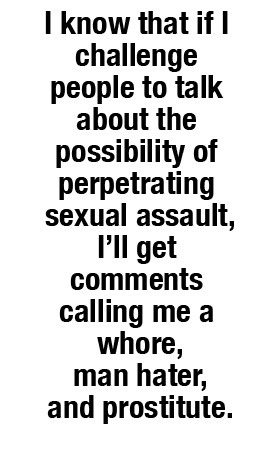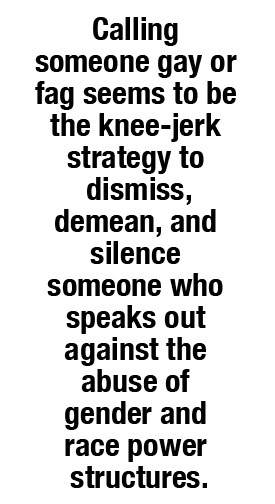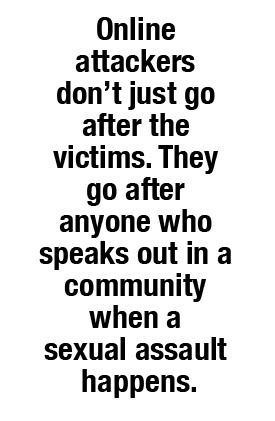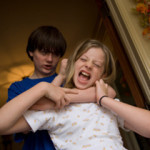Rosalind Wiseman's Blog, page 36
June 20, 2013
7 Words You Shouldn’t Say To Your Kid

There aren’t many times when I feel like “Never do X” is the right thing to say to your child. But last week I came across one. I posted on my Facebook page: “Never tell your son or daughter: ‘They’re bothering/teasing/hitting you because they like you.’” I don’t approve of that explanation because it makes it seem as if the adult condones this as an acceptable way to show affection and attraction. And obviously it’s not.
But after that post, I realized I was guilty of doing something I’m always reminding teens not to do: criticizing without making suggestions on how to make it better. So I’m going to use some of the online responses I got from readers to frame the way I think about this very common problem.
One reader wrote about emotional intelligence:
What do we say?! I always struggle with this! I try to say something like, “Sometimes people don’t know how to talk to people and are feeling lonely.” I need words!
This mother is trying to teach her child empathy—a worthy goal. While that’s fine as part of what a parent should say, it shouldn’t be the only thing. It’s not assuring your own child that they have the right to not like how the other kid is treating them. Also, it’s also critical to stop yourself from making any assumptions about what’s going on and ask your child for details. Say something like:
“Thanks for telling me and I’m really sorry you’re dealing with this. Can you share a little more specifically what the child is doing so I can get a better idea of what’s going on?”
For younger kids you’ll probably want to add this:
“If the kid is doing something inappropriate or embarrassing and it’s hard to tell me, do the best you can. You won’t get in trouble for saying bad words right now because you’re telling me what’s happening to you.”
Another reader wrote about self-expression:
Some little girls were bothering my son (they are 5th graders) and they don’t seem to have the maturity or social skills that make them understand it’s not okay. He did complain though and it stopped. I just wish an adult could help to come up with alternative ways to show someone they like them.
This is an example of how hard it can be to “teach” these skills to kids. The teacher is much more likely to see these dynamics but will understandably feel uncomfortable telling the kids how to behave when they have a crush on someone. But the parent who may feel more comfortable talking to their child wouldn’t usually see this going on. It’d be easy to not realize they should talk to their child specifically about how you show someone you like them—unless it gets intense enough that someone complains to the school like the boy above. These issues usually come up the most between 3rd-5th grade.
As a parent, have a two-minute conversation with your child that goes something like this:
“Sometimes in your grade people get crushes on other people. When a person gets a crush they can be nervous around the person they like. But sometimes, and this can seem weird, they can show their feelings by bothering the person and even teasing or hitting them. Just because someone likes you doesn’t mean it’s OK for them to treat you like that. So if that ever happens to you or anyone else I want you to remember that. And you can tell me and we can figure out what’s the best thing to do.”
A final reader wrote about on-going problems:
My 12-year old beautiful daughter has had a problem for many years of boys teasing her or “bothering” her to get her attention. So, what do you recommend we say or do instead?
As kids get into middle school there really is a possibility of inappropriate sexual behavior and harassment but it will be seen as liking the person. Again, it’s absolutely critical to ask your child the details so you and your child can distinguish what kind of behavior is going on and then decide what is the best way to proceed. But if I were the mother of the twelve-year-old girl above, I’d say to her:
“I want to talk to you for three minutes about the way boys are treating you. How do you feel about what the boys are doing? If you don’t like it, can you tell them to stop and they do?”
If she is too embarrassed to tell you, tell her you understand why it’d be hard to tell you but you just want her to know that if she doesn’t like it she has the right to not like the attention and she has the right to tell them to stop and have that request respected.
If she does open up to you, suggest to her that she say one-on-one or by text or email to the boy (i.e. not in front of other kids) who is bothering her the most one short sentence that says exactly what she wants stopped. If she says she doesn’t want to be “mean” this is a great opportunity to teach her that communicating her personal boundaries—in a clear and civil manner—isn’t mean.
Originally posted in Family Circle Momster
Daily Dot: Does online hate silence us?
 The first time I received, “I hope you die, bitch,” my heart jumped. Was that really directed at me? I clicked on the person’s profile. There he was—a young man I didn’t know, telling me he’d prefer I die, and sooner rather than later. Why was he tweeting this at me? I thought back to my recent presentations, media appearances, and articles I’d written and then noticed that his comment immediately followed a blog I’d written about a thirteen-year-old girl who was raped by an older boy.
The first time I received, “I hope you die, bitch,” my heart jumped. Was that really directed at me? I clicked on the person’s profile. There he was—a young man I didn’t know, telling me he’d prefer I die, and sooner rather than later. Why was he tweeting this at me? I thought back to my recent presentations, media appearances, and articles I’d written and then noticed that his comment immediately followed a blog I’d written about a thirteen-year-old girl who was raped by an older boy.
As I write this, Mary Elizabeth Williams has just reported in Salon that three boys raped and sodomized a 12-year-old girl and then posted their assault on Facebook . For people who have suffered a rape, it’s not enough to have been assaulted and abused. No, they must also endure their perpetrators often publicizing their abuse, and then try to survive the onslaught of callousness and disregard for their basic humanity when that public abuse is tolerated.
Although some know me best as the Mean Girls woman, my life’s work has been to teach young people how to speak out about racism, sexism, and homophobia and to challenge other adults to do the same. But I know that if I challenge people to talk about the possibility of perpetrating or by-standing to sexual assault, I’ll get comments calling me a whore, man hater, and prostitute. I also know that if I support a teen who is being harassed for speaking out about being sexually assaulted (either male or female), I will get ridiculed and dismissed—often by individuals from the victim’s same community.
 Receiving hate mail is part of my profession. It doesn’t kill me. It doesn’t make me cry on my couch and moan about why people are so mean. But being threatened and demeaned online is now part of my life, and so I’m constantly thinking about if and how it impacts what I write and how to best respond. I also try to take a step back and think about how these attacks possibly influence us, both individually and collectively.
Receiving hate mail is part of my profession. It doesn’t kill me. It doesn’t make me cry on my couch and moan about why people are so mean. But being threatened and demeaned online is now part of my life, and so I’m constantly thinking about if and how it impacts what I write and how to best respond. I also try to take a step back and think about how these attacks possibly influence us, both individually and collectively.
For me, it’s critical to distinguish between the “types” of online hate mail I receive. The first is the kind above, where the commenter is enraged that a woman is challenging a culture where some men exploit their power to physically and sexually abuse others without consequence (even as I write this I am preparing for the comments I’ll get for writing that sentence.) The other type of online hate mail occurs when I call attention to something being racist, sexist, or homophobic and I am then perceived to be either censoring someone’s right to express racist, sexist or homophobic views; or I am calling something racist, sexist or homophobic because I am too stupid to correctly interpret whatever it is that I am calling attention to. Usually, because I am a middle-aged woman.
Here are some recent examples of that second type of hate response:
@rosalindwiseman I bet she got raped by a whale cock and the jizz turned her into a fag.
Everyone tweet @rosalind wiseman is a fag
@rosalind wiseman F****** fag
Sure, I laughed when I read those tweets. Notwithstanding Jason Collins’ recent coming out and our increasing acceptance of same sex marriage, it’s still true that calling someone gay or fag seems to be the knee jerk strategy to dismiss, demean, and silence someone who speaks out against the abuse of gender and race power structures.
 My responses to these “comments” are inspired and guided by two bloggers: John Sclazi’s Straight White Male is the Lowest Difficulty Setting There Is (actually even better than the first blog are the two updates he wrote in response to his hate mail) and another from Rock Paper Scissors. These are my gold standards for how to respond to trolls in an intelligent and strategic way because they refute every standard “reason” for the attacks while calling out in a funny way the ridiculous cowardice of raging against someone anonymously on a comment thread.
My responses to these “comments” are inspired and guided by two bloggers: John Sclazi’s Straight White Male is the Lowest Difficulty Setting There Is (actually even better than the first blog are the two updates he wrote in response to his hate mail) and another from Rock Paper Scissors. These are my gold standards for how to respond to trolls in an intelligent and strategic way because they refute every standard “reason” for the attacks while calling out in a funny way the ridiculous cowardice of raging against someone anonymously on a comment thread.
In reality, both kinds of online attacks are connected—I’m either a fag or a whore—because they’re demeaning someone based on a dominating and regressive definition of masculinity. But they affect me very differently. I can address things like the tweets above confidently. I have had countless, very positive conversations with young men who have started out thinking I was over-sensitive and politically correct. But the other kind, where men exploit their power to threaten me, is way harder; it gets to my core.
I, like all women, am conditioned to fear rape in a way that men are simply not. This is because in our general social context (i.e. outside of prison) rape isn’t a threat men generally feel they have to fear. I’ve spent my career teaching and writing about the “pushback” that is an inevitable part of challenging abuse of power and have a second-degree black belt—but getting those threats still makes me break out into a cold sweat.
When I am threatened with violence I inevitably go through the following process. I get upset for about five minutes, decide whether to tell my husband (or, in some cases, the police). Then I remind myself that I chose this profession, get over it, and get back to work.
Of course, “choose” is the definitive concept here. It is my choice to engage in this cultural warfare. But that’s not the case for the children and teens whose assaults I write about. Like the 12-year old girl above who will inevitably face onslaughts of verbal bile from men who, like her rapists, refuse to recognize her humanity and believe they have the right to tell her so. And there are women who buy into this system and attack the girl as well.
 Online attackers don’t just go after the victims. They go after anyone who speaks out in a community when a sexual assault happens. Over and over again, I’ve witnessed others who try to support the victim (often as young as the victim herself) get attacked just as viciously.
Online attackers don’t just go after the victims. They go after anyone who speaks out in a community when a sexual assault happens. Over and over again, I’ve witnessed others who try to support the victim (often as young as the victim herself) get attacked just as viciously.
What is clear to me is that these hate attacks online aren’t just silencing us from supporting the victims. They are also impacting the emotional health of our communities. We must support the people who are victimized online with powerful action, just the way we would (we hope we would) after a sexual assault or a violent crime. We can’t be satisfied with easy answers like, “Those boys must have been raised by horrible parents. What’s wrong with people today?” Or, to the victims, “Don’t let those people bother you. Don’t let them get you down. You know what really happened.” While that may be true, it doesn’t do anything to collectively challenge the tyranny of this abuse of power. We must also support the people around victims of online bullying and victimization who are trying to uphold the victim’s dignity within their communities through civil participation in online and real-life forums.
No one should not have to endure any of this—I shouldn’t have to square my shoulders and tolerate rape threats, and victims of assaults shouldn’t be attacked in the first place and then be systematically and publicly humiliated. If we stay silent and watch the ugliness spill out online unhindered, we are contributing to the victim’s degradation and our own. We must open our mouths and speak. We will speak to our children, we will speak to each other, and we will relentlessly commit ourselves to upholding every individual’s right to be treated with inherent worth.
Originally published in The Daily Dot
7 Words You Shouldn’t Say To Your Kid
 There aren’t many times when I feel like “Never do X” is the right thing to say to your child. But last week I came across one. I posted on my Facebook page: “Never tell your son or daughter: ‘They’re bothering/teasing/hitting you because they like you.’” I don’t approve of that explanation because it makes it seem as if the adult condones this as an acceptable way to show affection and attraction. And obviously it’s not.
There aren’t many times when I feel like “Never do X” is the right thing to say to your child. But last week I came across one. I posted on my Facebook page: “Never tell your son or daughter: ‘They’re bothering/teasing/hitting you because they like you.’” I don’t approve of that explanation because it makes it seem as if the adult condones this as an acceptable way to show affection and attraction. And obviously it’s not.
But after that post, I realized I was guilty of doing something I’m always reminding teens not to do: criticizing without making suggestions on how to make it better. So I’m going to use some of the online responses I got from readers to frame the way I think about this very common problem.
One reader wrote about emotional intelligence:
What do we say?! I always struggle with this! I try to say something like, “Sometimes people don’t know how to talk to people and are feeling lonely.” I need words!
This mother is trying to teach her child empathy—a worthy goal. While that’s fine as part of what a parent should say, it shouldn’t be the only thing. It’s not assuring your own child that they have the right to not like how the other kid is treating them. Also, it’s also critical to stop yourself from making any assumptions about what’s going on and ask your child for details. Say something like:
“Thanks for telling me and I’m really sorry you’re dealing with this. Can you share a little more specifically what the child is doing so I can get a better idea of what’s going on?”
For younger kids you’ll probably want to add this:
“If the kid is doing something inappropriate or embarrassing and it’s hard to tell me, do the best you can. You won’t get in trouble for saying bad words right now because you’re telling me what’s happening to you.”
Another reader wrote about self-expression:
Some little girls were bothering my son (they are 5th graders) and they don’t seem to have the maturity or social skills that make them understand it’s not okay. He did complain though and it stopped. I just wish an adult could help to come up with alternative ways to show someone they like them.
This is an example of how hard it can be to “teach” these skills to kids. The teacher is much more likely to see these dynamics but will understandably feel uncomfortable telling the kids how to behave when they have a crush on someone. But the parent who may feel more comfortable talking to their child wouldn’t usually see this going on. It’d be easy to not realize they should talk to their child specifically about how you show someone you like them—unless it gets intense enough that someone complains to the school like the boy above. These issues usually come up the most between 3rd-5th grade.
As a parent, have a two-minute conversation with your child that goes something like this:
“Sometimes in your grade people get crushes on other people. When a person gets a crush they can be nervous around the person they like. But sometimes, and this can seem weird, they can show their feelings by bothering the person and even teasing or hitting them. Just because someone likes you doesn’t mean it’s OK for them to treat you like that. So if that ever happens to you or anyone else I want you to remember that. And you can tell me and we can figure out what’s the best thing to do.”
A final reader wrote about on-going problems:
My 12-year old beautiful daughter has had a problem for many years of boys teasing her or “bothering” her to get her attention. So, what do you recommend we say or do instead?
As kids get into middle school there really is a possibility of inappropriate sexual behavior and harassment but it will be seen as liking the person. Again, it’s absolutely critical to ask your child the details so you and your child can distinguish what kind of behavior is going on and then decide what is the best way to proceed. But if I were the mother of the twelve-year-old girl above, I’d say to her:
“I want to talk to you for three minutes about the way boys are treating you. How do you feel about what the boys are doing? If you don’t like it, can you tell them to stop and they do?”
If she is too embarrassed to tell you, tell her you understand why it’d be hard to tell you but you just want her to know that if she doesn’t like it she has the right to not like the attention and she has the right to tell them to stop and have that request respected.
If she does open up to you, suggest to her that she say one-on-one or by text or email to the boy (i.e. not in front of other kids) who is bothering her the most one short sentence that says exactly what she wants stopped. If she says she doesn’t want to be “mean” this is a great opportunity to teach her that communicating her personal boundaries—in a clear and civil manner—isn’t mean.
Originally posted in Family Circle Momster
Why I’m Sending My Sons To Cotillion
 My husband and I have relentlessly taught our children to hold doors for people. We’ve told them they need to ask to be excused from the dinner table and they’re aware they should write “Thank You” notes for gifts. Trouble is, my boys haven’t exactly internalized those lessons. Over the years, I’ve seen that I needed reinforcements. Enter: Cotillion prep.
My husband and I have relentlessly taught our children to hold doors for people. We’ve told them they need to ask to be excused from the dinner table and they’re aware they should write “Thank You” notes for gifts. Trouble is, my boys haven’t exactly internalized those lessons. Over the years, I’ve seen that I needed reinforcements. Enter: Cotillion prep.
And yet I came to an awkward realization when a friend recently asked me why in the world I’d send my sons to cotillion. Aloud, I explained to her that the classes were simply basic manners and dance. In my head, I suddenly became aware that if I’d had a daughter instead of sons I’d never have thought to enroll her in anything close to cotillion.
If I’d had a daughter, I wouldn’t have wanted her learning the gender baggage that goes along with programs like this. As gleeful as I was to get my boys into suits and ties, I’d never have pressured a girl into a dress with white gloves. And I wasn’t alone. In my kids’ classes, many more parents of boys signed up their sons. There was even a last minute campaign to recruit girls.
Why were parents of boys so eager and parents of girls so reluctant? I think it’s because the drawbacks of sending a girl to cotillion are more obvious to all of us. Sending girls to a manners class where boys “choose” them to dance or they learn how to set a table sends the message that they’re expected to grow up to be perfect hostesses. It doesn’t matter that the boys are learning the same domestic skills alongside the girls. If we teach these things to girls, it feels like we’re betraying them.
I completely understand these concerns. But what’s amazing to me is that parents of boys (like me) so rarely think about how these gender expectations impact their sons. There are two reasons why. First, these gender rules don’t seem so bad for boys. A suit doesn’t seem as constraining as a party dress. Second, we’re desperate to civilize them. There’s an everyday reality that our boys can come across as loud, inconsiderate and sloppy. I’ll share what it’s like for me:
1. My sons move fast – and in doing so they can be blind to people around them. They literally have closed the door in the face of an elderly person. In spite of making them stand for fifteen minutes and open doors as a “teachable moment” (after doing this to that older woman), they still need more opportunities to slow down.
2. Last year, we moved to Boulder, Colorado from Washington D.C. Dressing up in Boulder means wearing darker jeans and a new flannel shirt. I’m sorry but my East Coast self just can’t handle that. Different situations demand different attire.
3. I strongly believe that personal style shows how a person wants to present himself to the world. That is entirely different than my son picking up the sweat pants he dropped on the floor last night and putting them back on because he can’t be bothered to open the clothes drawer. Honestly, I’d much rather have a kid who spiked his hair into a huge Mohawk and wore black skinny jeans than one who wears dirty sweatpants with holes in them – my boys’ go-to outfit.
4. Everyone needs practice dealing with horribly awkward social situations. And what’s more excruciatingly awkward than a school dance? By the time my boys walk into their first “Under the Sea”-themed 8th grade dance, they’ll feel a little more experienced and at ease with the whole thing.
But the question of gender baggage is important. I don’t want my children thinking that they should be polite to girls because they’re delicate or that boys fit into a “boy box” and girls fit into a “girl box.” Or that anyone who doesn’t fit or doesn’t want to fit into those boxes is somehow less worthy. So, while my husband and I talk to them about that in countless ways, this process has made me link these conversations and values to these classes. And yes, they’re rolling their eyes, and sighing as they say, “I know mom” but that’s totally fine.
The bottom line is I want them learning basic manners, giving up their seats and opening doors for anyone because they need to look out for and be considerate of other people. But there’s another thing. Last month, at my aunt’s birthday party, my older son asked my mom to dance. As I watched them, you can imagine how I felt. I may have to sign them up again next year.
Originally posted in Family Circle Momster
Family Circle, Ask Rosalind: “I Can’t Afford to Give My Kids Everything. Will They Suffer Emotionally?”
 Q. How do you keep your family happy? And by “happy,” I mean comfortable without cost. Times are tough now, but I don’t want my kids to suffer emotionally because I can’t afford to give them everything.
Q. How do you keep your family happy? And by “happy,” I mean comfortable without cost. Times are tough now, but I don’t want my kids to suffer emotionally because I can’t afford to give them everything.
A. Although life can be horribly stressful when money is tight, it’s so clear to me from my work around the country that having a lot of cash is no guarantee of a child’s contentment or a family’s harmony. So I’d like you to consider redefining happiness as striving for these four things in life: curiosity, hope of success in something you feel good about, being a part of something beyond yourself, and feeling connected to your loved ones and your community. I’ve found that’s where true joy lies for adults and kids. And if your children still complain about not getting the latest iPhone, have an honest conversation with them that includes a look at the family budget. When you do this calmly, your kids are more likely to accept (and appreciate) why their entire Christmas list isn’t going to end up under the tree next month.
First posted on Family Circle Momster.
Family Circle, Ask Rosalind: What Can I Do to Ensure My Daughter Doesn’t Use Drugs?
 Q. I’ve heard first-time drug use rises during the summer months, when kids have more free time on their hands. What can I do to ensure my daughter isn’t getting high?
Q. I’ve heard first-time drug use rises during the summer months, when kids have more free time on their hands. What can I do to ensure my daughter isn’t getting high?
A. The quick solution is to schedule activities to keep your daughter busy so she isn’t spending her summer bored and searching for things to do. But the long-term approach is encouraging her to develop a passion for something — something that would be jeopardized by doing drugs. Then explain what she could lose by not resisting these kinds of temptations. And that loss has to matter to her, not necessarily to you. For example, my son loves to play basketball. So when I talk to him about drinking, smoking or drugs, it’s about how they impair his athletic ability and compromise his team loyalty. (If his performance suffers or he gets kicked off the team, I want him to view it as letting down the other kids.) My son, like all our children, will have to make these decisions when we aren’t around. So if we want them doing the right thing, we have to explain the wrong choice in terms that truly matter to them. The National Institute on Drug Abuse has a free online booklet that I really like with great advice on talking to your kids about drug use. Go to drugfactsweek.drugabuse.gov and download Drugs: Shatter the Myths.
Originally published in the June 2013 issue of Family Circle magazine.
CNN Living: How do you talk to your son about rape?
 (CNN) — In the aftermath of the guilty verdict in Steubenville, Ohio, parents should be taking this opportunity to ask themselves this painful question. But what parent can even contemplate that a child they love could so callously disregard someone’s basic human rights? At the same time, the media is filled with experts chastising parents for not being involved with their kids and wanting to be a friend instead of a parent.
(CNN) — In the aftermath of the guilty verdict in Steubenville, Ohio, parents should be taking this opportunity to ask themselves this painful question. But what parent can even contemplate that a child they love could so callously disregard someone’s basic human rights? At the same time, the media is filled with experts chastising parents for not being involved with their kids and wanting to be a friend instead of a parent.
All this may be true, but what is equally true is we never acknowledge how difficult it is to accept our children as possible perpetrators of abuse or bystanders who will “let” it happen—and then refuse to come forward after the fact (as in Steubenville). It doesn’t even occur to a parent that their child could threaten to kill or beat the victim for coming forward.
As a parent and educator, I don’t want to do it either, but we have to face facts. There isn’t a community in this country where girls (and boys) haven’t been sexually assaulted. Everyone knows someone who has been raped, even if they haven’t told us. We may have been sexually assaulted ourselves. But there’s a culture of silence around these horrible acts, so when it’s our turn to teach our children about these issues, we don’t even think about it until it’s too late. And even if we did want to talk about it, we don’t know how.
We must talk to our kids as possible perpetrators and bystanders. And our advice about what to say has got to go beyond, “How would you feel if this happened to your mother or sister?” First, no one has any idea what the perpetrator’s relationship is like with those women in his life, but it’s not a huge leap to think he doesn’t hold a great deal of respect for them. Second, these boys have dehumanized their victim. In that moment, they don’t care.
Parents need to know how to talk to our children. From eighth grade on, here’s one possibility:
“You may see things that are really messed up, and it’ll be a real struggle to know what to do. It could be what a guy is doing to another guy, what a guy is doing to a girl, or a girl is doing to a girl. It could be at school, in the locker room, at a party, or in someone’s house. In the first moments when you realize something’s wrong, it’s really easy to not believe what you’re seeing or to convince yourself that it’s not serious. Other people can try to convince you that nothing’s wrong. Trust your gut. Or think about what I’d think if I could see what’s happening. If you can’t speak out in that moment, I’m asking you to leave the room and call me or another adult you trust. Sometimes these things happen so fast that it’s hard to really process what’s happening. You can always tell me, and I can help you figure it out.”
For the parents who are caught in the aftermath, unless your child is being criminally accused of rape or some kind of assault, please don’t get caught up in definitions. You don’t have to call it rape and you don’t have to invoke the legal system to say unequivocally to your child:
“I love you. You are my son. That doesn’t take away that your actions have hurt another person and you need to be held accountable. You will, in time, come to terms with what you did. Through that process I will be by your side. But I will not deny what you have done and I will deeply reflect on how we got to this place. Anytime you would like to talk to me about this, I will be here.”
I know this isn’t anything parents want to talk about with their son. I wish things were different. But our sons live in a world where all this is possible. We have to be ready to stand for what is right. The only way that’s possible is if we find the words that matter to our children.
Originally posted on CNN.com
June 13, 2013
Corporate Testimonial
I just finished reading all 280 student surveys and the consistent theme is that Rosalind was “AWESOME!!!” A few comments directly from the surveys:
“Rosalind’s discussion with us was truly amazing. Rosalind should talk to all girls.”
“Rosalind was the perfect speaker and I most definitely wouldn’t mind hearing from her again!”
“From my perspective, Rosalind was a great speaker and a joy to work with. She was flexible, professional and able to connect with the girls. She incorporated the theme of our forum, “Leadership” into her Keynote to drive home her message to the girls.”
“Rosalind was speaking directly to us.”
In our survey we asked the girls who else they would like to hear from in the future. The most popular response was “Rosalind, again!” The second and third most popular responses were Oprah and Maya Angelou. Thanks for everything.
Capital One
Testimonial from Montreal Canada
Rosalind was compelling and profound and so easy to deal with. The feedback from participants was uniformly positive. Parents really appreciated her clarity and concrete strategies. And the professional audience understood that she really knows schools and kids and was able to offer teachers and administrators real answers to their issues and questions. It was an honor and privilege to work with her and learn from her.
Ometz
Testimonial New Albany Teacher
Your presentation far exceeded expectations. There were 1300 kids and you commanded the room with power, expertise, authenticity, and intimacy—no small feat. The kids were universally positive in response to your presentation. The key is your no-nonsense authenticity. You established a measure of intimacy with the kids, who felt you were talking directly to them. We’ll do our best to incorporate your messages into our daily lives. Keep up the good work! You are making a difference.
Mark, High School Teacher
New Albany, OH



